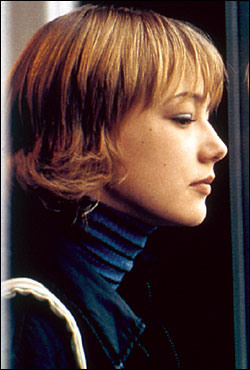The role of Becky Sharp, sacrificing anyone and everything for a toehold in English society, is red meat to any jaguar actress, but who’d have guessed that Reese Witherspoon had exactly the chops for it? Only director Mira Nair—and perhaps Witherspoon herself. Her choice of roles from Election to Legally Blonde has always seemed carefully calipered-so many overachievers you love to hate, so many “cute” and “pesky” gnats. Now she’s ready to let ‘er rip in Vanity Fair (which opens Wednesday, Sept. 1, at Guild 45th and other theaters).
For this overripe Regency period of early 19th-century England, Nair has turned Witherspoon’s steeliness molten. Through the great Declan Quinn’s lens, she’s luscious and womanly for the first time. (She was also pregnant for most of the filming, a luminosity that can’t be improved upon.) The results are a triumph all around: Glittering and gay, Witherspoon’s Becky never falters on her way up-and down-yet she makes us truly give a damn, in a production of burnished darks and peacock silks.
To have an Indian director for William Makepeace Thackeray’s biting satiric novel is a natural, since India and the East run like a scarlet ribbon through Vanity. Thackeray took particular delight in portraying the discombobulation of aristocrats in an era when “mere” merchants, their pockets bulging from their plunder of the Orient, suddenly wanted equal status in society. What cheek!
Nair knows the status game backward and forward (Indians learned it from the English, then upped their ante), and she takes as much delight in its utter sham as Thackeray did. As with Thackeray, Nair has a clear eye for the era’s racism. But, as she’s done in all her films (including Monsoon Wedding and Mississippi Masala), that fury is turned into art. This is a movie, not a lecture, and certainly not a museum tour. So, scandalously, her Vanity is a maid’s-eye view of these hoity-toity masters without their wigs, scratching their scraggly gray heads, and stepping, undraped, out of the bath. These are the great and grand up close, Nair says, take a good whiff.
We meet Becky as a 7-year-old in her artist-father’s shabby studio, where screenwriter Julian Fellowes (Academy Award winner for Gosford Park) goes Thackeray one better by having Becky cross paths now with a crucial figure from her later life-that terrifying observer of human nature, Lord Steyne (Gabriel Byrne). When Steyne, a patron and collector, arrives to buy her father’s fine small painting, Virtue Betrayed, Becky demands a small fortune for it. “It’s her dead mother,” the painter apologizes.
Grudgingly, she strikes the deal, and within this single invented encounter we see the qualities that mark Becky forever: she’s streetwise; she runs her father’s—or any man’s—life; she’s a canny businesswoman and a motherless child; and, when the price is right, she’ll sell her own mother. All that’s left to discover is her gift for singing, the purest thing about her.
Her rise begins when she leaves the young woman’s finishing academy at Cheswick where, after her father’s death, she’s scrubbed floors and taught French (her mother’s language) until she can graduate. School at least brings her one real friend, the uncloyingly sweet Amelia Sedley (Romola Garai, faultless), who’s well-off, but not titled. Nair charts a clear, sure path through the rising and falling fortunes of both young women, observing marriages, motherhood, the Napoleonic war, Waterloo, widowhood, financial crashes, and the fast and fickle currents of London society.
Witherspoon holds herown sturdily with the film’s great character actors: Bob Hoskins as that very rough diamond, Sir Pitt Crawley, Becky’s first employer; Eileen Atkins as his filthy-rich aunt, Miss Matilda Crawley, the first to discern Becky’s wit and gift for mimicry (“You shall sit next to me, child, and after dinner we shall abuse the company”); Jim Broadbent as the grasping merchant Osborne, intent that his son, George, marry money, and lots of it, rather than Amelia, whom he loves; Tony Maudsley as Jos, Amelia’s portly, mouth-breathing brother, enamored of India (and Becky); and Rhys Ifans, rescued from a career of playing boobies in films like Notting Hill, as the reliable Dobbin, silent and increasingly poignant worshiper of Amelia.
Even upstaged by their scarlet and gold Queen’s Guard uniforms, Jonathan Rhys-Meyers as George Osborne and James Purefoy as Rawdon Crawley, Becky’s rakehell love, manage to make their characters men of real spirit and honor.
Becky is masterly at guile and faux innocence; what she cannot control is what pours out of her when she sings. (The liquid voice is actually supplied by Appalachian-born soprano Custer LaRue.) There may not be a musical sequence anywhere to equal Becky’s singing at Lord Steyne’s soiree, a minor-key setting of Tennyson’s “Now Sleeps the Crimson Petal.” Haunting, mesmerizing, and finally deeply moving, its power assures her entree into society at last. Poor little fool.








